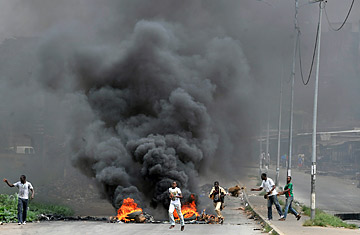
Supporters of Alassane Dramane Ouattara burn tires on a street in Abidjan
After nearly four months of postelectoral turbulence which has seen banks shut, political activists targeted and food prices rise dramatically, citizens of Ivory Coast's commercial capital Abidjan have become jaded. "There are a lot of people who have gone mad with poverty and misery here," says unemployed mechanic Yassa Touré. Which is why last Monday he barely looked up from his coffee at a roadside stall in Abobo, a working-class suburb of Abidjan, when a man ran past screaming that the army was approaching and would "mow down civilians." "An hour later presidential guards drove into the neighborhood," says Touré. "They had machine guns mounted on trucks. The next thing I knew was the noise of heavy weapons being fired." The shooting lasted six hours. When it was finally over, says another Abobo resident, a 52-year-old shopkeeper who gave his name as Ali, "I opened my door and there was a man lying there, blood everywhere. Next to him another corpse had half his face missing."
Three months after the disputed election left Ivory Coast with two presidents, the country looks to be sliding back to civil war. Sporadic violence since the vote has left at least 300 dead, according to the United Nations. But this week, even as the African Union sent in a high-level mediation delegation that included four African presidents, the blood-letting escalated sharply. On Feb. 23, after five days of direct clashes between fighters from both sides, forces loyal to president-elect Alassane Ouattara ambushed a police unit loyal to his defeated rival Laurent Gbagbo in Abidjan. Rebel forces who back Ouattara's claim to the presidency said they killed 27 of their opponents; Gbagbo's forces claimed to have lost only one, with two others missing.
That attack sparked more violence. The Ivorian army, which so far has pledged allegiance to Gbagbo, began firing machine guns and rocket-propelled grenades into neighborhoods it described as "infiltrated by pro-Ouattara rebels." A spokesman for Ouattara, who since the election has been holed up in Abidjan's Golf Hotel surrounded by an army blockade, said, "What the police are claiming is 'infiltration by rebels' is simply called resistance. Ouattara supporters have been harassed, intimidated and targeted for months." Then he added, "I don't understand how a man using heavy arms against his own population expects to remain in power."
The seeds of civil war were planted decades ago. After gaining independence from France in 1960, Ivory Coast was under the autocratic rule of the ethnic Ivorian former French minister Félix Houphouët-Boigny. From Ivory Coast's plantations of cocoa, coffee, pineapples and bananas, he built one of the most prosperous nations in Africa, with economic growth of 10% or more for two decades. When Houphouët-Boigny died in 1993, tensions began to bubble between Ivorians and migrants from across West Africa, who were attracted to Ivory Coast by its prosperity and mostly settled in the north of the country. In 2000, Gbagbo won an election in which Ouattara was barred from standing. In September 2002, northern rebels launched an uprising, while warlords from Liberia entered the fray. A peace deal signed in January 2003 quickly collapsed amid frequent outbreaks of violence between the two sides. Meanwhile Gbagbo, whose term expired in 2005, repeatedly postponed elections, finally holding them last November.
In that context, says an independent analyst who asks not to be named, the recent escalation by pro-Ouattara forces should be seen as a continuation of a long struggle to oust Gbagbo and finally achieve political representation. "There's a clear strategy here," he says. "There are armed professionals who support Ouattara. And dislodging Gbagbo from the seat of power, Abidjan, is a logical first step for them. There will be a power showdown." A showdown certainly seems to be what Gbagbo's security forces expect, as they patrol the capital's smarter neighborhoods day and night. In Abobo, meanwhile, hundreds of residents have fled, pushing their belongings on carts or bundling them high on their heads, while others barricade themselves into their homes. "The best scenario, which is in fact quite bad, would be a country that remains divided with two separate administrations with the possibility of military confrontation in the future," says International Crisis Group West Africa director Gilles Yabi.
The worst-case scenario is countrywide civil war. In the north, rebels have openly started training again. The U.N. is also concerned about battles in the volatile western region, where government forces routinely clash with the rebels. It reports a burgeoning humanitarian crisis over the border in Liberia, which has been swamped by some 40,000 fleeing Ivorians. An additional 40,000 Ivorians are internally displaced, it says. In Abidjan, there is a sense that an anti-Gbagbo insurgency is emerging. "All I know is that each time [we move], somebody warns [our assailants] of our movements," one government soldier told TIME. "Each time, some [of us are] killed."
Back in Abidjan, the mood is simultaneously defiant and tense. Ouattara supporters in the coastal district of Koumassi danced around a burned-out police truck on Tuesday. On Wednesday, in the buzzing downtown quarter of Treichville, angry young men threw rocks at police cars. "I'm out here on the streets because we need to create an Egypt-style revolution," said one university student, Maxine. "Gbagbo can kill us, but one day he'll fall." Ouattara's Prime Minister, Guillaume Soro, has also called for an "Egypt-style" revolution.
But as long as the army continues to support Gbagbo, another student named Aya says she won't risk facing them. She gestures to a wall pockmarked with bullet holes that she walks past every day. "Dread seizes my heart every time I imagine what will happen if we want to overthrow him," she says.
